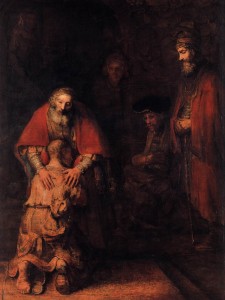Luke 15:1-3, 11b-32
This text is used for the Lectionary Year C on March 6, 2016.

The narrative of the prodigal son is certainly one of the most well-known parables in the gospels. We may be tempted to begin the reading in verse eleven, but there is good reason to commence with verse one. The passage opens by stating that tax collectors and sinners were coming to listen to Jesus. According to the Pharisees and scribes, he welcomed them and even shared meals with them. Collecting taxes and tariffs was considered dishonorable work, and those employed in this profession were known to take more than the mandated fees.
The sinners described in the passage were probably apostate Jews who were regularly breaking religious laws. We do not learn the specific nature of their sins, but those tasked with religious leadership were evidently appalled by Jesus’ willingness to mix with this class of people. They grumbled about Jesus’ actions, something that they had done before (Luke 5:29-30). Pharisees and scribes worked diligently to maintain their religious and cultural status. In contrast, Jesus had a history of upending the religious system by associating with outcasts and inviting them to repent (Luke 5:31-32). Jesus’ compassion continues to raise questions today about the identities of religious outcasts and the hospitality they ought to receive.
Jesus addresses the concerns of the Pharisees and scribes by telling three parables about loss and return. The recoveries of a treasured sheep and a valuable coin symbolize the repentance of a sinner, something that brings joy to heaven. The lectionary passage picks up at verse 11 to explore similar themes of restoration in the parable of a prodigal son. A wealthy man with two sons is approached by the younger one with a troubling request. The son seeks to claim his future inheritance of property, initiating a breakdown of family relationships. While the son would likely have received a portion of the family’s wealth in the future, it would be highly unusual for a father to grant an inheritance under these circumstances. The younger son shames his father, showing a stunning absence of loyalty in a culture steeped in commitment to family honor. We do not learn anything about the father’s thoughts or feelings at this point, only that he assents. Families then and now struggle with the irresponsible and hurtful behavior of their loved ones. Circumstances like these continue to cause dissent and distrust in families today.
The passage moves on to describe the younger son’s departure after just a few days and his travels to a distant country where he squanders his family’s resources through drunkenness and debauchery. When the money runs out, he finds himself in difficult circumstances. Jewish communities in the diaspora were known to give to the poor, but the son does not seek out their assistance. He is completely cut off from his familial, religious, and cultural roots. The son finds work tending pigs which would have been especially abhorrent to a man of Jewish descent. Even this employment did not provide adequately, and the son would gladly have eaten the pods meant for the pigs.
The parable goes on to say that the son finally realizes that he need not continue on this path to starvation. Even his father’s hired hands have more than adequate provisions. It is not surprising that his immediate concern is about physical survival, not repentance. Yet as he considers options, he recognizes that confession will be necessary. He has given up the right to participate in his father’s household, but he could return as an employee. When the son approaches his childhood home, the father sees him and hurries out to meet him. The father could have acted in anger and turned his son away or at the very least preached a sermon about the evils of foolish living, but he takes a very different approach. Before the son even has a chance to speak, the father embraces him. While the son confesses and acknowledges his unworthiness, the father is calling for clothing and food, meeting his son’s obvious physical needs. Instead of testing his errant son to see if the repentance is genuine, the father calls for a celebration of the lost young man’s return to home and family. Like this father, God’s gracious love is sufficient for every outcast. A welcome is extended even before the sinner repents, and God rejoices at every homecoming.
Given the pattern of the other two parables, we might imagine that the story of the prodigal son would end here. But Jesus is not finished with his tale, and he is not finished instructing the religious leaders. He offers another side to the story that is meant to call them to compassion and hospitality. Jesus goes on to describe the elder brother’s return from work. A servant shares the news of the prodigal’s return and the father’s response, and the elder son is furious. He is shocked by the terrible injustice that the unfaithful son is rewarded! When the father goes out to speak to the elder son, he drops all reference to kinship with brother or father. He compares himself to a slave, and refers to his brother as “this son of yours” (NRSV). In his fury, the son distances himself from his family, even as his brother once did. The father’s forgiving character is evident once again as he pleads with his eldest son, longing for them to share in this joyous homecoming together.
One of the most compelling contemporary resources on the narrative of the prodigal son is Henri Nouwen’s discussion of his encounter with Rembrandt’s classic depiction of the parable in The Return of the Prodigal Son: A Story of Homecoming. Nouwen was profoundly affected by the painting, and he describes what it means to identify with all three of the characters in the narrative. The parable urges us to come home to God with the younger son, to let go of resentment with the elder son, and to forgive and celebrate reunion with the father.
 Dr. Angela Reed
Dr. Angela Reed
Assistant Professor of Practical Theology; Director of Spiritual Formation
George W. Truett Theological Seminary, Waco, TX
Angela_H_Reed@baylor.edu
Tags: prodigal, Nouwen, tax collector, Pharisees, scribes, eldest son
